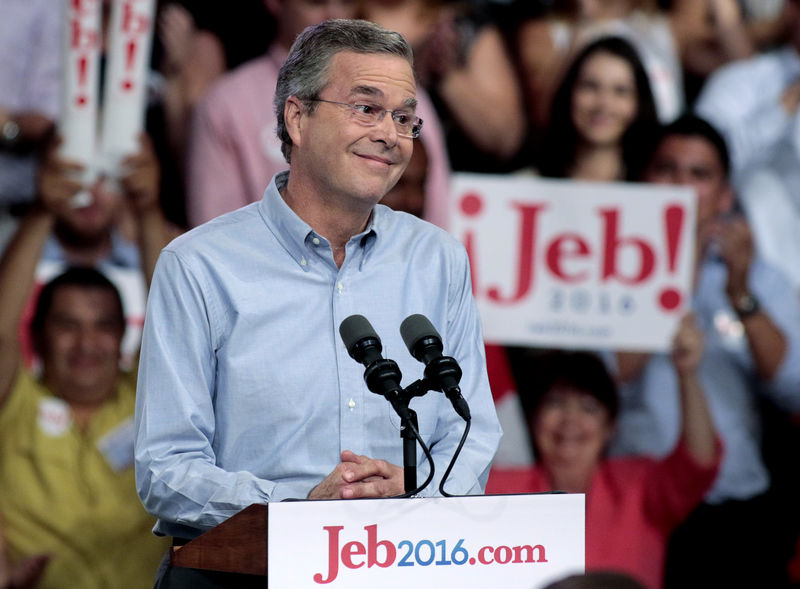Who is Kevin Hassett? Wolfe looks at the Trump ally tipped to become Fed Chair.
By Andy Sullivan
WASHINGTON (Reuters) - Former Florida Governor Jeb Bush starts his presidential bid with strong name recognition but only lukewarm support from the Republican moderates whose backing he will need to capture his party's nomination, according to a Reuters/Ipsos poll.
The poll points to potential problems ahead for the party's best-known candidate, who is banking on support from moderates to make up for his limited appeal among the conservative voters who play an outsize role in the Republican nominating process.
"One of Bush's enduring political strengths is that he is acceptable to the broadest section of the party," said Fergus Cullen, a former chairman of the New Hampshire Republican Party who is neutral in the race. "The question is, is he going to be the first choice of enough people?" (Graphic: http://reut.rs/1MMi0Fd)
Some 14 percent of Republicans say Bush is their favored candidate for the November 2016 election, putting him at the head of a crowded Republican field despite his limited appeal among the most ardent conservatives.
Bush's front-runner status stems from his relative strength among the moderates who account for more than half of all voters in the party. Bush wins the support of 18 percent of these voters, at least six points ahead of his nearest rival, former Arkansas Governor Mike Huckabee.
But interviews with a dozen Republican voters indicate that Bush's support isn't especially firm at this point in the race, when few voters are paying close attention.
Bush's famous last name is an asset for those who fondly recall the presidencies of his father, George H.W. Bush, and brother George W. Bush. Several poll respondents told Reuters in follow-up interviews that they supported him because they simply were not familiar with other candidates.
"I'm very likely to change my mind now that other candidates are coming out," said Tonya Hodge, 48, a child-care worker in Murrels Inlet, South Carolina.
Bush's formal entry into the race gives him an opportunity to build on this support by making his pitch directly to voters after six months in which he has focused on wealthy donors.
Bush advisers say his appeal will grow as voters learn more about his record as Florida governor from 1999 to 2007, when he cut taxes and revamped the state's underperforming school system. His anti-abortion and pro-gun views will help him make inroads among conservatives, they say.
Some strategists say the poll bears this out. "It looks like Jeb's doing pretty good," said David Woodard, a Clemson University political scientist. He said Bush's struggles with conservatives may be blown out of proportion.
DIVISIONS WITHIN THE PARTY
Reuters surveyed 2,852 self-identified Republicans over the month of May and asked them about topics like health care and foreign policy as well as which candidate they liked best.
The results provide insight into an electorate that has been sharply divided over issues like immigration and upended by the grass-roots Tea Party movement. The online poll has a credibility interval of 2.1 percent.
Bush draws the support of only 6 percent of the most conservative Republicans, ranking seventh behind rivals like Wisconsin Governor Scott Walker and Texas Senator Ted Cruz.
Bush has not sought to paper over his differences with the party's right wing on immigration.
Bush argues that the 11 million illegal immigrants should be given legal status as part of a comprehensive overhaul of the immigration system - a position many Republicans deride as amnesty for lawbreakers.
Conservatives point to this dispute as a sign that Bush would be an unreliable ally in the White House.
"I don't trust him. He's lenient on immigration, he's for big business," said poll respondent Doug Sharp, 68, a retiree from Sheboygan, Michigan, who is a Cruz supporter.
Though conservatives make up 9 percent of the Republican electorate, they account for 16 percent of voters in the state-by-state nominating contests.
Bush can win the nomination by appealing to everyone else, a strategy that worked for past Republican nominees like Mitt Romney in 2012 and John McCain in 2008. That broad-brush approach may be more difficult in a year when other candidates like Florida Senator Marco Rubio could eat into Bush's support among moderates.
"To me it seems like a guy like Bush who is stuck swimming at that end of the pool, there's a little bit of danger," said Craig Robinson, a former political director of the Iowa Republican Party.
